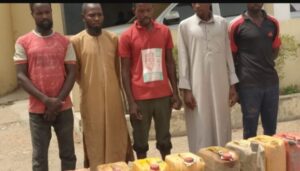Unlike other developed nations of the world like the United States of America and United Kingdom where diversity is a catalyst for socio-economic transformation, Nigerians have not been able tap into the nation’s diversity as a currency for unity and integral development. Instead of seeing the 371 tribes across the country as a huge deposit waiting to mature, Nigerians see themselves first either as Igbo, Yoruba or Igbo. Sadly too, it is easy for fellow countrymen and women to regard themselves first as Muslim, Christian or Animist than Nigerian. As a consequence, we are left with a weak sense of nationalism and lack of patriotism. Here are ten practical ways of reversing the ugly trend.
First, education and youth empowerment are key to ensuring social cohesion in the country.The saying “an idle head is the devil’s workshop” applies here. If the youth are gainfully employed, they would not have time for drugs, armed robbery or be easily recruited into the ranks of Boko Haram, armed bandits or kidnappers. No doubt, qualitative education would curbpoverty and illiteracy. Training in entrepreneurial skills by various Non-Governmental Organisations (NGOs) and Civil Society Organisations (CSOs) can change the narrative.
Second, since knowledge liberates, it is incumbent on various state governors to prioritize peace-building activities which educate citizens on the importance of social cohesion. This should include workshops and seminars by various CSOs and NGOs on the need to respect diversity and see one another first as human beings created in the image and likeness of God and second, as Nigerians. This might entail training on Early Warning Signs as well as guidance and counselling for parents on religious tolerance.
Third, another practical way of entrenchingpeaceful coexistence in the community is building synergy and consensus amongst various groups such as men, women and youth. In like manner, these groups should synergize with security agencies, political office holders such as Councilors and Local Government Chairmen as well as not-for-profit groups towards peace-building initiatives in every community.
Fourth, citizens must be willing to report issues of rape, sexual violence, armed robbery, kidnapping and other criminal activities to vigilante groups and other security agencies. Security personnel and civil society groups should train the citizenry on dictating Early Warning Signs of conflict. In the same vein, there should be training of vigilante/hunter groups on the understanding of justice and how to support the community to build social cohesion. Government should equip them with skills of how to apply the law in dealing with perpetrators of conflict and other crimes especially if these perpetrators are minors.
Fifth, it is a well-known fact that a society whichrewards its own promotes excellence. It is in this light that various stakeholders across the country can promote social cohesion by rewarding peace-ambassadors or heroes of peace who have distinguished themselves in heroic acts which lead to social cohesion.
Sixth, in collaboration with their members, community leaders can organize the community to embark on common projects such as provision of a borehole in the village or repairing a bad road. Such an action makes a big statement. Christians, Muslims and Animists can collaborate to promote justice and peace. Since God has given us custody of the earth to be used for the glory of his name (Cf. Genesis 1:2), it is only appropriate to collaborate in addressing various social concerns.
Seventh, leaders should educate the led on violence and encourage young people to embrace peace-building skills. Learning the essentials of interpersonal and group communication as veritable tools for conflict resolution is key. Both intra and interfaith cohesion should be encouraged. Conflict resolution should not be initiated in a way that it would leave some negative consequences where one party feels they have been defeated but should be aimed at restoring confidence.
Eight, there is no question about respect and tolerance for the creed of others. Increased awareness about what the other person from another faith believes is critical to entrenching tolerance. There should also be training on religious tolerance. It is the obligation of leaders to preach and ensure social cohesion. Perhaps government needs to be active in its role of monitoring and sanctioning hate preaching. It is safe to say that learning about other people’s way of life is essential to embracing the lessons of social cohesion.
Ninth, to entrench social cohesion in Nigeria, there should be mature and sincere “supportive feedback” between leaders and their followers. Once in place, feedback helps Service-Users to hold Service-Providers accountable. It assists in resolving the poor and unequal relations between the two. It also helps inimproving intangibleservices like unity leading to Joint Action Plans. This requires creating models of creativelistening and clear communication at flashpoints across the country.
Tenth, given the importance of group communication in every society, it is crucial for all who hope to engage in any meaningful social cohesion to use the group communication model. This allows for free social and spiritual exchanges as well as feedback among participants in a group which further engenders meaningful dialogue leading to peaceful coexistence in every community and the larger society.
In conclusion, social cohesion entails fighting exclusion, ending marginalization, creating a sense of belonging for all and promoting oneness. There is an urgent need for government at levels to widen social investment initiatives towards deepening inclusion and promoting a sense of nationalism in every Nigerian. By the same token, government must work hard to reduce the high rates of poverty and unemployment among the nation’s youth demography. Initiating conscientious dialogue would further bridge the fault lines of mutual suspicion across the country. Critical stakeholders like traditional and religious leaders also have an ever increasing role to play in promoting oneness, mutual trust and social cohesion in the country. God bless the Federal Republic of Nigeria.
Fr. Dyikuk is a Lecturer of Mass Communication, University of Jos, Editor – Caritas Newspaper and Convener, Media Team Network Initiative (MTNI), Nigeria.







